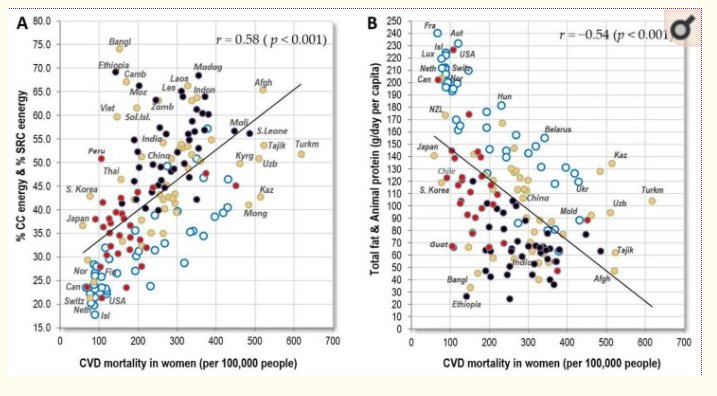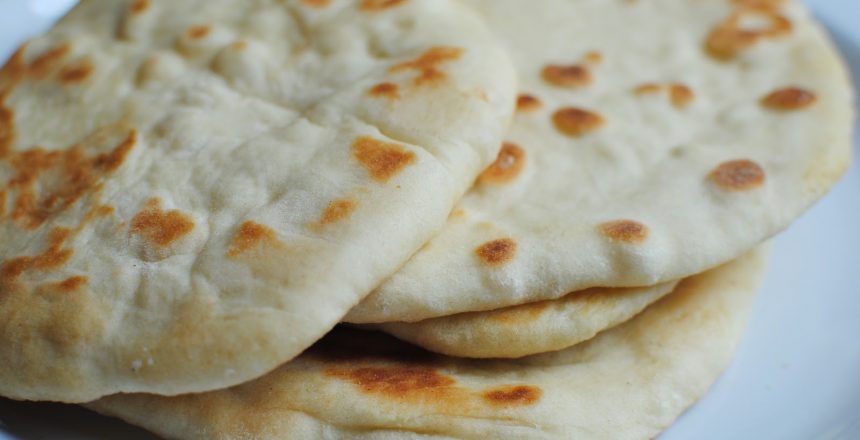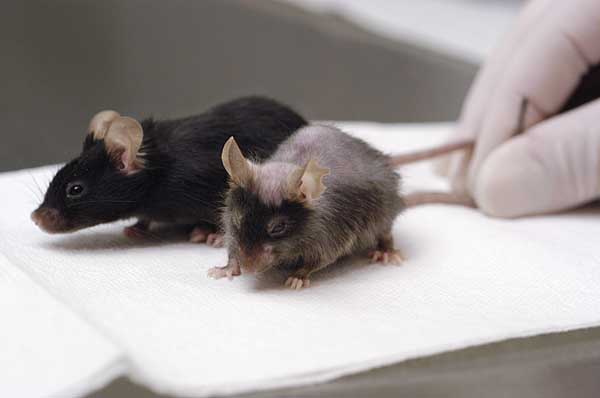Health authorities have told us to eat more carbohydrates – “healthy whole grains” – for the past several decades, as a benign alternative to allegedly deadly saturated fat. Their story is now unraveling, as recent and divergent lines of evidence point to carbohydrates as detrimental to lifespan and healthspan. In this article we’ll look at the evidence that dietary carbohydrates increase death rates.
The PURE Study
The PURE Study looked at over 135,000 people in 18 countries, and tracked what they ate and at what rate they died. The study found that dietary carbohydrates were positively associated with death and cardiovascular disease rates, and dietary fat was negatively correlated, i.e. the more dietary fat, the lower the death and disease rate. Results shown in the graph below.

This is an epidemiological study and therefore cannot prove causation.
Nevertheless, at least a couple other epidemiological studies have found the same: 1) carbohydrates, not saturated fat, are associated with cardiovascular disease; 2) “high carbohydrate consumption (mainly in the form of cereals and wheat, in particular) as the dietary factor most consistently associated with the risk of CVDs” (ref.)

What about evidence beyond epidemiology? If animal and other evidence supports it, then we can have better confidence in the result.
Ketogenic diets increase lifespan
A ketogenic diet extends longevity and healthspan in adult mice. (Ref.)
In fact, ketogenic diets may be equivalent to fasting and/or calorie restriction in their effects on lifespan and health. (I wrote about that here.) Since calorie restriction is the most robust lifespan-extending intervention yet found, if a ketogenic diet produces the same result, that’s great news.
You wouldn’t have to restrict calories in order to get longer life and better health, you would merely restrict carbohydrates, and eat as much as you wanted.
Much interesting new research proposes that calorie restriction produces its benefits via ketones. “Ketone bodies mimic the life span extending properties of caloric restriction“.
Benefits of fasting due to fewer carbohydrates
Intermittent fasting duplicates many of the physiological benefits of calorie restriction.
Much of the benefit of fasting may be due to the absence of carbohydrates.
One study calculated that 100% of the changes wrought by fasting was due to eating no carbohydrates. Carbohydrate restriction regulates the adaptive response to fasting. When volunteers either fasted for 3.5 days, or got an infusion of lipid for the same time, “Changes in plasma glucose, free fatty acids, ketone bodies, insulin, and epinephrine concentrations during fasting were the same in both the control and lipid studies.”
Oncologist Rainer Klement wrote: “I propose carbohydrate restriction as probably the best way to mimic CR [calorie restriction] in humans without the need to restrict energy intake.” (Ref.)
Another study estimated that 71% of the lowered glucose seen in short-term (24-hour) fasting may be due to no carbohydrates. (Ref.)
Acarbose and metformin
Acarbose is an anti-diabetic drug that inhibits an enzyme responsible for uptake of glucose from the intestines, and it increased lifespan by by 22% in male mice, 7% in female. (Ref.) In humans, acarbose dramatically reduced the incidence of cardiovascular events in diabetics. (Ref.)
Since carbohydrates break down into glucose upon ingestion, and acarbose prevents that and increases lifespan and lowers the rate of CVD, then it seems that simply not eating carbohydrates would do the same.
Metformin is another anti-diabetic drug that lowers glucose and insulin by inhibiting gluconeogenesis, the production of glucose from amino acids and fats in the liver. Diabetics who take metformin may live longer than non-diabetics who do not take metformin. (Ref.)
That’s a startling fact, but must be tempered by the knowledge that even most non-diabetics in this day and age have high insulin and impaired glucose tolerance.
Metformin also increases lifespan in lab animals. (Ref.) “Treatment with metformin mimics some of the benefits of calorie restriction, such as improved physical performance, increased insulin sensitivity, and reduced low-density lipoprotein and cholesterol levels without a decrease in caloric intake.” [My emphasis.]
Metformin mimics CR, which is recapitulated by fasting, which is all (or mostly) about carbohydrate restriction.
By the way, there’s even a rapamycin connection here. Rapamycin, a drug that extends lifespan, also results in the production of ketones and better insulin sensitivity. (Ref.)
And a ketogenic diet inhibits the mechanistic target of rapamycin (mTOR). (Ref.)
Conclusion
Multiple lines of evidence lead to the conclusion that dietary carbohydrates, especially refined grains and starches, promote mortality and are bad for health.
Decreasing carbohydrates, either entirely via a ketogenic diet, or even somewhat, improves health and increases lifespan.
If you want to avoid these carbohydrates, then avoid the following foods:
- breakfast cereal
- bread, tortillas, naan, bagels
- pasta
- pizza
- donuts, candy
- soft drinks, fruit juice
- potatoes














36 Comments
I would agree that excessive consumption of carbs, especially carbs in the form of refined grain or sugar, are harmful to health. I think you are going a bit far, though, by demonizing a whole class of compounds. I try to limit my consumption of grains and sugar, but I’m not going to give up potatoes, for example, as I have not seen any evidence that carbs from consuming vegetables/tubers, in moderation, are harmful to health. Veggies like carrots, beets, etc. also contain a fair amount of carbs, and if you stop consuming those in an effort to avoid all carbs, I don’t think you are doing yourself any favors, from a health standpoint. Those veggies contain minerals, antioxidants and a host of other beneficial compounds also. At any rate, I don’t plan to give up potatoes and other carb-rich veggies in an effort to avoid all carbs.
Agree 100%.
Eating sugar in any form will spike insulin with everything that results. Simple carbs convert to sugar in the digestive process rather quickly. Potatoes are simple carbs. Not as simple as raw sugar, but close.
It isn’t “demonization” to point out cause and effect in basic nutrition. It is science.
Meat spikes insulin too – in some cases worse than some grains.
Of course, the insulin thing is more of a problem because most of us sit on our butts all day.
Meat does spike insulin if you eat too much of it. I limit the amount to 150-180 grams (28 grams/oz). Everyone should have a digital food scale and a blood glucose monitor. If you don’t have those, and they are inexpensive, you are flying in the dark.
Both fish and beef steak are more insulinogenic than pasta and about as insulinogenic as grain bread
This is true and not a problem at all. The insulin response is driving nutrients to our cells NOT battling elevated blood sugar (which would be the case after eating bread/pasta).
https://www.marksdailyapple.com/insulin-index/
Interesting. You mean protein being driven into cells? Maybe food insulin index is a poor measure – is glycemic index a better measure for our concerns here?
It seems like glucose score (GS) might be a better measure of what we’re trying to measure. The newer data from Kirstine Bell gives a GS of 30 ish for oatmeal and white pasta and 15-20 for beefsteak and fish. Interestingly cheddar cheese and eggs are higher than oatmeal and white pasta.
Recent data suggests that most people can only use about .24 g/kg of protein for muscle protein synthesis. So it seems to me like extra protein from meat that are above this what-you-can-use threshold could increase blood sugar and some of the insulin response (as measured by FII) could be a result of extra protein.
Your thoughts?
Technically not correct. Fructose has zero effect on blood sugars and is why sucrose, half glucose and half fructose, has a lower glycemic index than any of the monosacchyrides. (Dextrose, glucose, etc.)
No need to go to extremes. We need healthy carbs, just as we need healthy fats and protein.
https://www.thelancet.com/journals/lanpub/article/PIIS2468-2667(18)30135-X/fulltext
There’s no dietary requirement for carbs.
True. But the study cited, tells us another story…
The problems with that study are legion. Two food frequency questionnaires over a 27 year period, no one ate less than 37% carbs, on and on. That study is a joke.
Your premise is absurd. Don’t tell that to the zero carbers, some who have lived decades without the consumption of any overt carbohydrates. And have lived with health to be jealous of.
“This is an epidemiological study and therefore cannot prove causation.”
Rewrite your title. I’m tired of these kind of titles.
This sounds like Ron Rosendale’s diet – minimal carb’s AND protein – just enough protein to maintain healthy muscle mass. Lots of veggies and healthy fats. The problem is I want to enjoy my meals. I don’t like vegetables.
I am not going to stop eating foods of civilization e.g. bread and pasta. My concentration is on minimizing insulin load per meal. I eat carbs with low food insulin index and I eat minimal total carb calories to minimize food insulin demand/load. E.g. I only eat small, thin slices of mixed grain bread (low food insulin index). Small bowl of oatmeal (lower food insulin index than a beef steak) for breakfast with lots of healthy fat. Pasta (as low a food insulin index as oatmeal) in small quantities with lots of healthy fat.
You have to avoid high protein – protein not used to synthesize new muscle increases insulin too.
Look at the traditional Okinowan diet. They eat lower protein (not truly vegan), moderate carbs, lower total calories. Are we really going to push our average lifespan to something much longer than theirs (they not only live long, they age well)?
Also, if a eat a bad “carby” thing e.g. ice cream, I force myself to exercise it off afterwards by running, walking, etc. enough to burn off all the carb calories in my “cheat.” A serving of ice cream forces me to run a mile – this helps you to control how much you eat since I hate running.
How bad is rice? I have cut out bread and potatoes from my diet by about 90%. I rarely eat processed carbohydrates. I have even cut back on my rice consumption by 50%, but how bad is it?
Rice turns to glucose when digested, same as other starchy or refined carbs.
So does unused protein (I believe) albeit there is inefficiency in the process of gluconeogenesis.
And your body can’t use a great deal of protein at a meal. The evidence is mixed but many researchers are saying muscle protein synthesis is maximized at about .24 g/kg of body weight (about ~20g of protein) for a meal. Any extra could become glucose, right?
I’ve been experimenting with cooking, refrigerating, reheating then back to refrigerating and reheating again. I test with my glucose monitor every 15 minutes after 30 minutes of eating. What I am finding is half (about) of the carbohydrates become indigestible and according to studies become heathy fiber for the large intestine. This is after the first reheating. Then through my tests I see additional drops in my glucose levels when I chill for a second time and then reheat. So cooking a measured amount of pasta weighed in grams and then eating it makes my blood sugar rise so many points on my blood glucose monitor. Then taking the same amount of pasta, then chilling it overnight in the freezer then reheating it, eating it, causes a 40% (about) drop in my blood glucose levels. Doing this again seems to cause another drop.
Twice cooked rice – verses – once cooked rice
122 Glucose levels before eating 121 Before eating
155 (@ 30 minutes) verses 174
155 (@ 45 minutes) verses 179
161 (@ 60 minutes) verses 204
152 (@ 75 minutes) verses 183
144 (@105 minutes) verses 175
Thrice cooked rice verses twice cooked rice Glucose readings then averaged
Before eating 124
11:10 AM: 150 verses 155 @ 30 minutes (152/147)
11:25 AM: 154 verses 155 @ 45 minutes (152/156)
11:40 AM: 141 verses 161 @ 60 minutes (142/134/148)
11:55 AM: 140 verses 152 @ 75 minutes (141/146/133)
12:25 PM: 133 verses 144 @ 105 minutes (123/133/143)
I plan on experimenting with white rice next. It seems from my experience these carbs from starches can be greatly reduced by the above process.
https://articles.mercola.com/sites/articles/archive/2018/04/30/digestive-resistant-starches.aspx
That’s really interesting . What jumped out at me was that the differences were big e.g. plain bread vs. frozen, defrosted, toasted bread.
According to researchers at the University of Sidney, white rice has a food insulin index (FII) of 79 on a scale where white bread is normalized to 100, pure sugar candy is 160, white potatoes are 120, an apple is 59, multi grain bread is 56, beef steak is 50 (I assume they mean lean steak-fat produces very little insulin reaction) and oatmeal and pasta (brown and white) are 40.
FII is a measure of your body’s insulin released per 1000 kJ (240 Kcal) portion, so the lower the better. So if you’re going to eat carby things, you’re better off eating oatmeal, pasta, grain bread, etc. and limiting portion sizes (they are definitely NOT “free” foods.)
Total Food Insulin Load takes into account actual portions since FII is for a standardized calorie count. So a small apple might be less insulinogenic than a typical serving of pasta (2 oz. uncooked) because an apple has less total calories. You have to multiply the FII by the calories in a serving size to compare two different foods.
By this measure, pasta or oats are better than rice. Of note: Asians eat quite a bit of noodles (and fat) and aren’t known for obesity.
Just my opinion as a guest here.
Also, “grain bread” means bread with various whole grains, seeds, etc. baked into it. Regular whole wheat bread is about as insulinogenic as white bread.
For 50 plus years weve been told to go low fat. All this has done is make people fat and sick. How can diabetes prolong your life? Sugar is as addict ing as alcohol.
You can eat a healthy diet without sugar. If anyone still believes this propaganda against going low carb they are nuts.Low carb still includes healthy fruit and vegtables. They big culprit is processed food. Especilly cereals and grains from Monsanto.
I haven’t seen anything on this site regarding raw oats. What are the author’s thoughts and findings? Carbohydrate, yes, but appear to be low glycemic and have a good protein and fiber profile.
Hi Stephen – While oats are not as bad as some other carbs, IMO there are much better things you can eat. I’m not convinced that fiber is necessary, and other foods have more protein.
Both fish and beef steak are more insulinogenic than pasta and about as insulinogenic as grain bread.
Sorry, this was intended for “thinker” above.
Sorry, Bruce, but I have to call bullshit on some of your statements. Especially meat being more insulinogenic than pasta. I can eat a big steak, my peak blood glucose (presuming this is a fair indicator of insulin production) goes up perhaps 20 units. I haven’t run any tests on pasta as I virtually never eat it, but are you comfortable saying that my BS would rise even less?
And looking at Glycemic Load, compare meats to anything else. I will question how the creator of this chart came up with a glycemic load for meat, since there are no carbs to use in the equation. OTOH, we know that complete protein, regardless of the source does have an impact on blood sugar, see above. But it is minimal compared to anything carbohydrate.
Something to ponder: https://www.lowglycemicload.com/glycemic_table.html
And there are carbs and there are carbs. Lentils have a very low GI, I suspect that a lot of the carbs are resistant starches. I’ve confirmed the low GI with my own tests. And the protein is amazingly complete. Not meat, but close to soy, without the problems of soy.
Hi PZO,
My statements were based on some research papers I found from the University of Sydney on FII – food insulin index (a measure of your body’s insulin reaction to various foods). FII is NOT the same as glycemic index. It’s possible I misunderstood the papers I read (I am not as good as PD Mangan at analyzing science papers). This page has some links:
https://optimisingnutrition.com/2015/03/30/food_insulin_index/
The data was for white fish (lean) and beef steak (which I assume means lean steak like top round). I wonder if you tend to eat fattier cuts of steak (which would have a lower FII due to fat content)
It’s possible the FII researchers are bullshitting us but their methods seem sound to me.
Thanks for the information on lentils. Lentils and split peas have a pretty high leucine content which is a good measure of their anabolic potential (they are incomplete in terms of EAAs). So do oats and pasta, although with incomplete EAAs.
Do you have any information on the protein quality of spit peas vs lentils?
Hi P.D.,
Long-time reader, love the blog (and tweets). Outstanding contribution to health knowledge, thank you.
Have you any thoughts or insights into histamine and meat?
A year or two ago I seem to have developed a histamine intolerance, probably due to years of a grain-heavy diet. I now eat strict paleo, but if I eat a lot of matured/aged meat, I have problems.
I love steak, love low-carb, and this is driving me nuts. Most beef is aged, as you know.
Do you know of any cuts of meat, or types of beef, which aren’t hung out for weeks? Or maybe I should temporarily focus on healing the gut, and then start reintroducing steak again?
Regards,
JfromIreland
Hi J from Ireland – that’s quite the question, and I’m afraid I can’t answer it. I don’t know about histamine intolerance and how aged beef might affect it. While I’ve heard of aged beef, I did not know most of it was aged. Is that true in the U.S. – if anyone out there knows? You could certainly try pork or chicken to eat, if beef is a problem.
Cheers P.D., I’ll definitely give that a go. A nutritionist (a legit one, pro-paleo, anti-vegetarianism) told me that for most people the histamine in fresh beef is perfectly fine because it’s so low. But for some, leftover meat can be an issue.
I must have an unusual sensitivity to it (e.g. canned fish is a disaster!)
I’ll take your advice and then slowly reintroduce beef.
Thanks again and please keep up the great work!